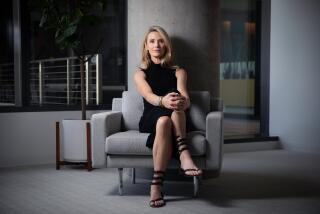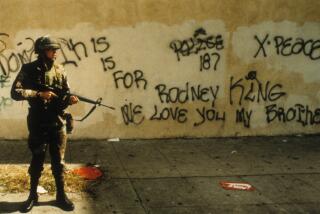Live, From Rape and Death’s Door
- Share via
The last time I’d seen Bridget Kelly, she was in a hospital gown.
Lying in a Texas hospital bed and bedeviled by tubes, she was in the early days of recovering from being raped and shot three times by a stranger who’d burst through her apartment door sometime after 2 a.m. and later left her to die in a deserted weed patch. Instead, Bridget crawled, then ran to the home of a man named Frank James, who helped the young woman. That was 7 1/2 months ago.
I saw Bridget again Saturday night in Omaha. This time, she was in an evening gown.
She was in Omaha -- my hometown and hers -- to receive a tribute, alongside James, from the local chapter of the Juvenile Diabetes Research Foundation. Two months after the attack, and perhaps because of it, Bridget, 25, was diagnosed with Type 1 diabetes and faces the regimen of daily insulin shots, blood tests and possible long-term health hazards that afflict about 1 million Americans.
Powerful Speaker
As daunting as diabetes is, it’s the rape that has become Bridget’s cause. And on Friday morning, back in her old high school, she conducted as powerful a seminar as I’ve ever seen.
During two somber, frank and intense sessions, Bridget talked to 275 students at Duchesne Academy, an all-girl Catholic high school, about the rape and her refusal to be shamed by it. The rape, she said, is a reality of her life but not its defining moment.
She urged any girl faced with a similar situation not to let embarrassment or shame prevent her from talking about it.
“You find out there’s this little, secret club that you never thought you’d be in,” she said, “but that once you are, you’re so glad you’re not alone.”
She took questions, and the girls held nothing back. They asked if she’d have considered an abortion had she become pregnant; whether she’s forgiven her attacker; whether she worries about future relationships with men; whether the faith burnished at Duchesne helped in her hour of need.
Bridget fielded them all: She didn’t think she could have an abortion but wouldn’t condemn anyone who did, under the circumstances. She hasn’t forgiven her attacker but hopes to someday. Friends, she said, had told her they’d prayed for him, and she got a laugh when she relayed her reply: “Good, that takes the burden off of me.”
Word Will Spread
Since the attack, Bridget, a first-grade teacher, has given interviews and taped a public service announcement. A “20/20” crew from ABC followed her during her weekend Omaha visit as part of a program planned for later this year.
I’ve known Bridget all her life. Her parents are among my best friends. I had no idea how courageous she’d be in helping others.
“She’s got guts,” says Heather Banuelos, director of a sexual-assault victim services program here in Orange County, when I tell her about Bridget. “We have respect for victims, period, but the fact that she’s able to go out there and talk about it takes so much inner strength.”
While not unheard-of, it’s uncommon for rape survivors to go public, Banuelos says. “There’s definitely still a stereotype and stigma that’s attached to them,” she says, citing the age-old tendency to blame the victim.
Last summer, when my first thoughts after hearing of the attack left me fearful she’d die, I thought Bridget looked beautiful in a hospital gown. I must say, however, that she never looked better than at Duchesne last week, coming back home and talking to a new generation of girls about courage, strength and self-respect.
*
Dana Parsons’ column appears Wednesdays, Fridays and Sundays. Readers may reach Parsons by calling (714) 966-7821 or by writing to him at The Times’ Orange County edition, 1375 Sunflower Ave., Costa Mesa, CA 92626, or by e-mail to dana.parsons@latimes.com.
More to Read
Sign up for Essential California
The most important California stories and recommendations in your inbox every morning.
You may occasionally receive promotional content from the Los Angeles Times.












